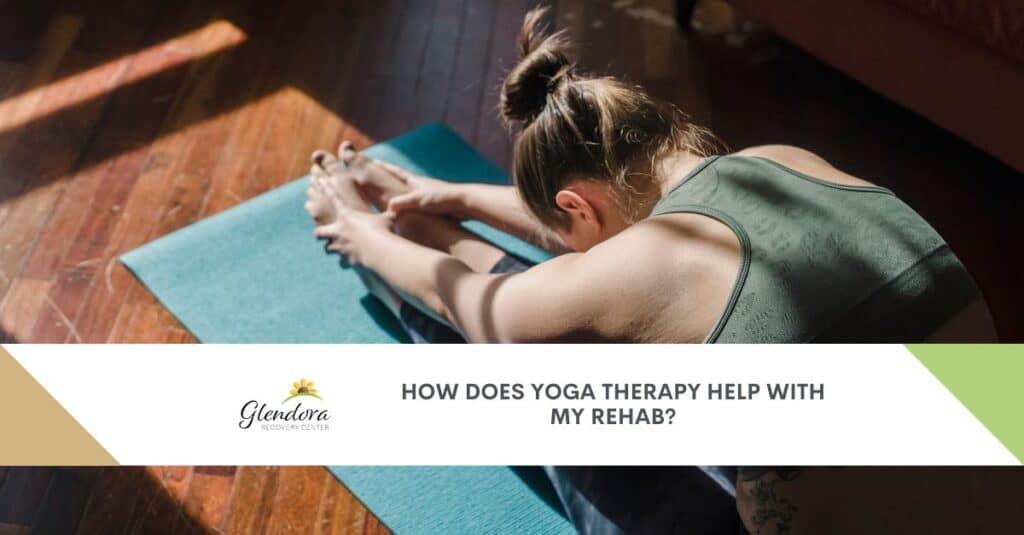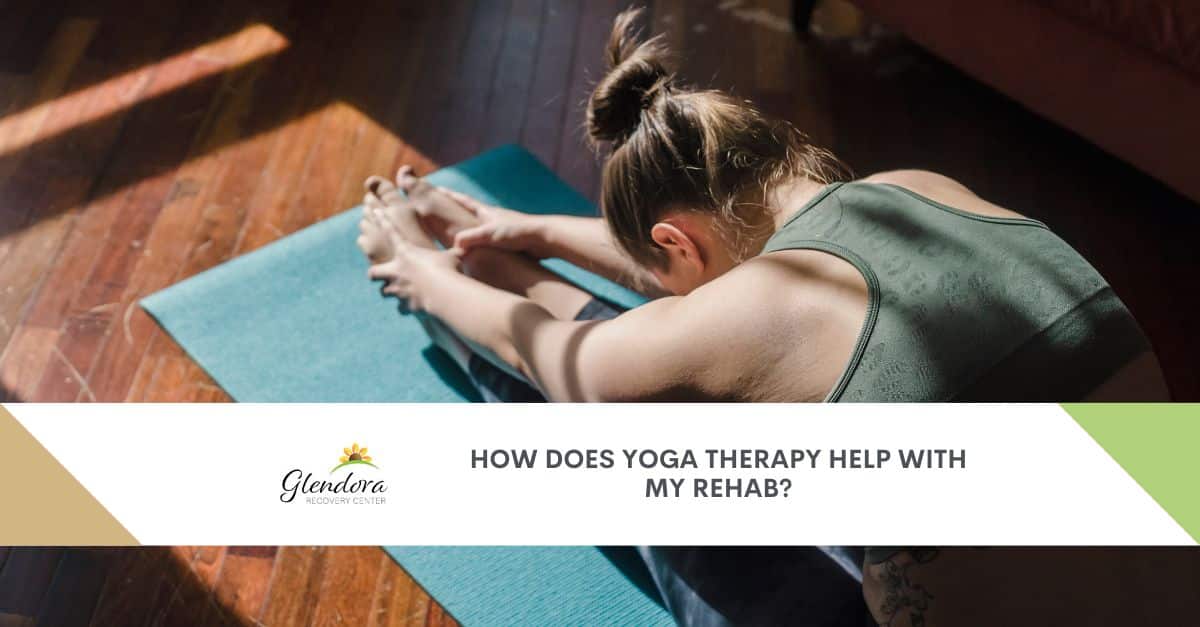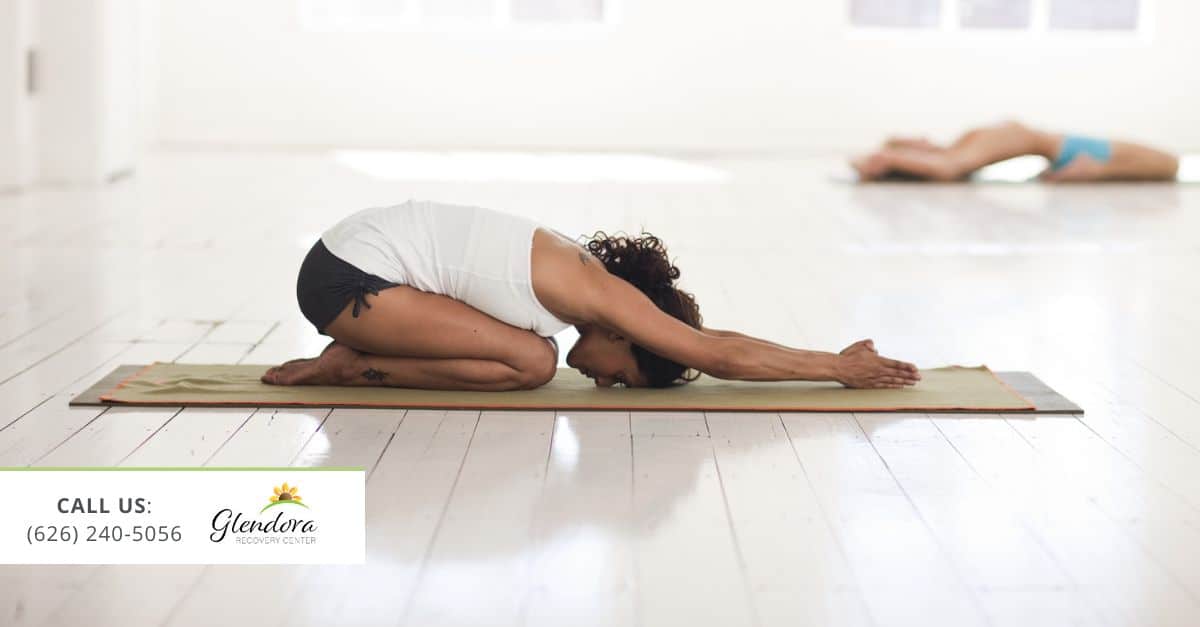Have you been looking for an alternative therapy that will help you overcome your addiction while also making you feel better during your drug rehab program? Do you want something that is different but still effective to boost and add to the individual and group therapy? Yoga therapy is available as part of our different detox programs at Glendora Recovery Center. If this therapy is appropriate for you and your specific situation, it can be beneficial in a variety of ways.
Yoga Therapy for Beginners
“Yoga” and “yoga therapy” are not synonymous. Although they might have similar movements and postures, the difference lies within their particular goals. Yoga therapy is intended to have therapeutic effects on your body while also improving your mental state. At Glendora Recovery Center, we believe in healing the whole person—mind, body, and spirit. We also believe that yoga has numerous benefits for our clients who find themselves in the early stages of drug or alcohol addiction recovery. Taking this into account, at Glendora Recovery Center, we have some of the best, most highly-trained yoga professionals anywhere. We employ those who are warm and compassionate in addition to their experience and aptitude with this particular type of therapy.
Yoga’s Mental Benefits
When a person misuses drugs and alcohol for an extended period of time, the brain connections are damaged. Many neural pathways are damaged, including those involved in impulse control, emotion regulation, decision making, and pleasure perception, creating a lot of changes in that person’s behavior. Getting away from drug or alcohol abuse and addiction can often help rebuild the damage done to the brain, and yoga can help with this process.
Yoga has been used for many years and in many cultures to relieve stress. There is an ever increasing body of scientific evidence linking yoga practice to stress reduction. Yoga regulates and balances stress hormones such as cortisol and adrenaline. Stress, anxiety, and depression are all common symptoms of drug and alcohol withdrawal; yoga can help to alleviate all of these symptoms. Throughout therapy, many of our clients have managed to have fewer anxiety symptoms, less depression, and an overall improvement in their mental well-being during their stay with us.
How Can Yoga Therapy Aid in My Drug Rehab?
Self-awareness is one of the primary goals of yoga therapy. Throughout yoga therapy, we use a variety of techniques to accomplish this, including breath work, meditation, and mindfulness. By engaging in these practices, you will learn to be more present in the moment and less focused on your thoughts. This can help you better control your emotions and avoid addiction triggers.
Yoga therapy is not necessarily a 12-step program, but it could be a valuable part of your addiction treatment. It can assist you in learning to manage your thoughts and emotions, which is a necessary skill for recovery. Additionally, yoga is, of course, also exercise. Yoga provides a fantastic way for many people who struggle with addiction to help their bodies become stronger and more fit while also feeling good.
Mindfulness Training
Many people struggling with an addiction find it difficult to sit still for long periods of time without their minds wandering. If this describes you, yoga can be a gentle introduction to the practice of cultivating mindfulness.
Mindfulness is all about being present in the moment as it is. Yoga requires you to be present as you move through the poses of the session. It gently guides you into practicing mindfulness without your being aware of it.
Many people recommend meditation when learning to cultivate mindfulness. It’s difficult to settle down and sit still for minutes of meditation. Misunderstandings about mindfulness and meditation cause people to give up before they even start.
What Takes Place During a Yoga Therapy Session?
There are several things you might expect from a yoga therapy session. While classes are tailored to individual students, most sessions include yoga techniques to help students with their practice. What could happen is as follows:
First and foremost, your yoga therapist will perform a thorough assessment before you begin. This ensures that you are both on the same page about your condition and allows you to collaborate to take the necessary steps to correct it. They may question you about your health issues, lifestyle, and why you’re seeking treatment. You will also establish specific objectives for this treatment.
Glendora Recovery Center Provides Yoga Therapy, Among Other Services.
When combined with other addiction treatment methods, yoga therapy is most effective. While yoga can help people in recovery develop mindfulness and stress-reduction skills, it’s also important for them to address other issues that can lead to relapse in order to prevent them. Yoga therapy is just one of the many ways we can assist you or a loved one with your drug rehab. When you first arrive, our professionals will conduct a thorough evaluation of you. With that information, we’ll design a treatment plan tailored to your specific needs. Yoga therapy is one option for many people. However, it can also include a lot more. You can reach us at (626) 594-0881 to take the first step





